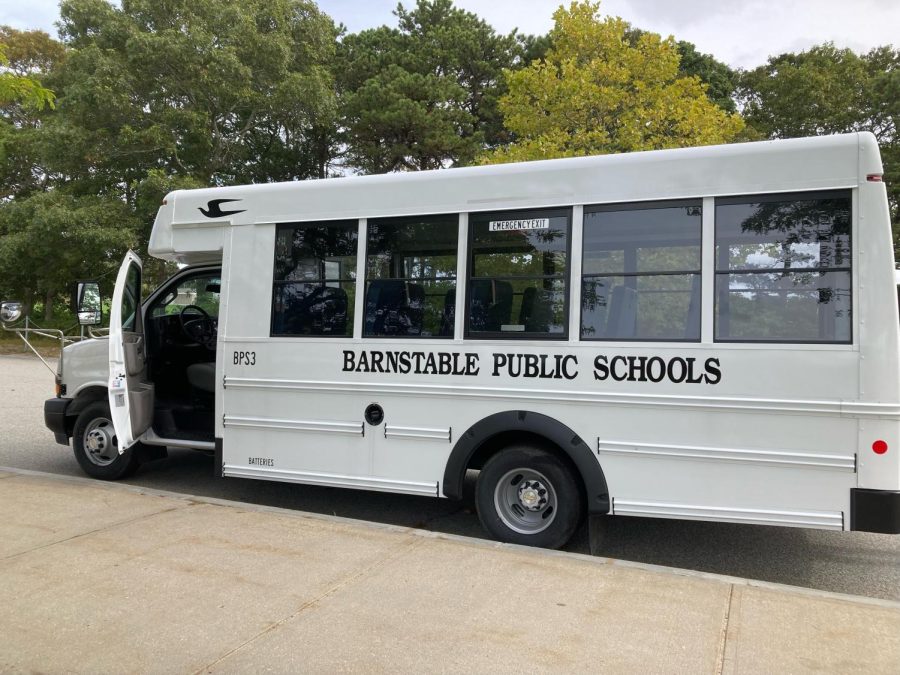New Bus Takes Environmental Science Classes To The Next Level
Photo by Rose Dibb
The new environmental science bus parked outside of the classroom.
October 17, 2022
Ms.Frizzle isn’t the only one with a bus anymore. The Barnstable High School Environmental Science and Technology program now has a class-specific bus. Environmental Science teacher Michael Smith said he has been trying to obtain a bus for the class since its establishment in 2019. At the time COVID-19 restraints caused Smith to struggle with the transportation portion of the class. Now with the town funded $61,000 for the bus that no longer poses a problem.
To be able to drive students in a bus, Smith was trained along with fellow science teachers Lily Munsil and Gregory Hill. Upon the establishment of the program Smith taught all portions of the pathway. Now Munsil and Hill are the teachers for the half year introduction part of the pathway. The intro portion is a one block class that doesn’t have much time to utilize the bus during just their classes. Hill expressed that he and Munsil will be forced to create longer field trips out of their usage of it. The bus holds 16 passengers, enough for each of theirs and Smith’s individual classes.
“I love a good field trip!” Musil said in regards to her class’s use of the bus being half-day-trips. The teachers aren’t the only ones anticipating the usage of the new bus though. Freshman Ava Upton said she was,”…excited to be in the only class with a bus,” upon the announcement that she will be using it in her Intro class.
The classes benefiting from the bus the most are the Environmental Science and Technology one and two classes taught by Smith. The Environmental one class also has a similar struggle with time in it being a one-block class, but the Environmental two class has the privilege of two back to back blocks. “We can actually do field testing, there’s more variety of sample sizes,” said senior Vivian Nguyen, a student in Environmental Science two. Without the bus the class walked to Dunns Pond and the pond behind Barnstable Intermediate School regularly from the highschool. Rather, Nguyen looks forward to the freedom to test water freely on Cape Cod without the limitations on transportation.
“[The] bus is another piece to the whole puzzle,” Smith said when asked of the future of the class. He plans on taking his students to many different local locations and believes that “It opens up many doors [for the class].”
A local place of interest that both Hill and Smith expressed excitement upon visiting is Fuller Farm. Through the classes partnership with the Barnstable Land Trust, the students will be able to use “field sampling techniques” to investigate the farm as well as doing population studies on bodies of water and identifying native and invasive species. Munsil also hopes they can participate in invasive species removal as well.
Another place of interest for Hill’s intro class to travel to is the proposed Twin Brooks Golf Course development. This development is set to house 312 new rental homes in 13 three-story, multi-family, residential buildings all in Hyannis. Hill hopes that his freshman students can use this as an opportunity to study the environmental effects of such a large-scale development.
The Environmental Science and Technology program also partners with the Cape Cod Commision, and plans to take part in their Freshwater Initiative. This initiative promotes pond health around Barnstable, which houses over 150 ponds that span over more than 1,800 acres of the town. This would mean trips to different ponds and packing the bus with field kits which students would use to study the water quality and other aspects of the ponds as well as working with the Commision.
Last year the Environmental two students took a field trip to the Silent Spring PFAS study, which is a study targeted to children who have lived in Hyannis and drank the town water in a specific time frame. Smith hopes to travel to the study with his classes again this year, but with more freedom and leeway now that they have their own transportation. He hopes to revisit the Aquaculture Research Corporation again as well, which raises a large majority of the shellfish eaten on Cape Cod, once again with more leeway and with more flexibility.
“We are almost at the point we wanted to be when we started the program,” said Smith.


